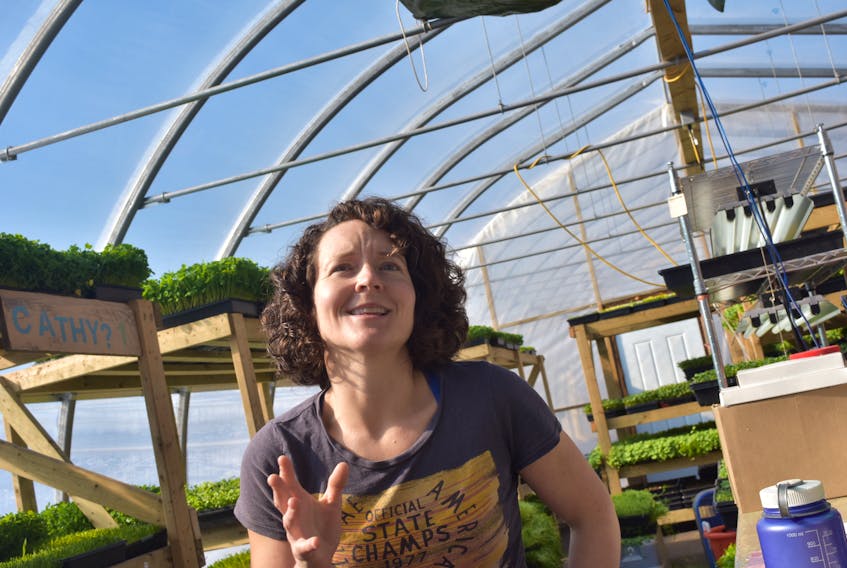Building rural economies and increasing Nova Scotia’s food security are challenges that are being met on the homesteads all across the province.
“I loved being home with the kids, but there’s an entrepreneurial streak in my family that quickly morphed into something a bit bigger,” said Cathy Munro, who lives in Pictou County with her husband and two children.
Munro was on maternity leave when her homesteading project started. That project of growing as much food for the family as she could soon turned into regular visits to the farmer’s market in New Glasgow.
From there she has grown her business into a year-round operation called Bramble Hill Farms.
“I was experimenting with being at the farmer’s market during my maternity leaves and really quickly felt the same pride in providing food for the community that I was feeling for my family,” said Munro from inside the greenhouse.
The greenhouse smelled like soil on harvest day, and outdoor shoes are left at the door to make sure nothing from the yard gets tracked inside to harm the plants.
Cathy and Tom Miller, who works 24 hours/week at Bramble Hill, were both busily preparing pea shoots, radishes, buckwheat and other mirco-greens for delivery on Thursday. It was warm inside despite the chill outside. Sunlight combined with propane heating lets Munro keep this operation going all year-long.
On Thursday, Munro will personally delivers to 15 different local-source markets and independent grocery stores between Pictou and Halifax.
The biggest barrier for upscaling in any operation are the capital costs, and things like the propane-heated greenhouse do not come cheap.
About an hour’s drive up the 104 into Antigonish County Dan MacIsaac is preparing for another season at Loch Aber Farms.
Three years ago, he bought the parcel of land near is childhood community of Ohio, close to Lochaber lake in Antigonish County.
“I always had a passion for farming,” he said during a phone interview. After high school he worked for ten years as a surveyor in Alberta. “About a year and a half into that I realized that it was more about work than it was about life and so I spent the next ten years trying to find land back at home.”
Today Loch Aber Farms sells free-range poultry, and eggs to local businesses and also operates as a Christmas Tree farm, but finding money to get started was a challenge.
For both Munro, MacIsaac, along with over 50 other small farms and businesses, it’s been the FarmWorks investment co-op that has made the difference in turning their homestead projects into sustainable businesses.
FarmWorks
“Things don’t have to be sexy in order to be necessary, and sometimes the necessary things like fruits and vegetables don’t attract the same attention,” said Linda Best.
She’s the founder of FarmWorks, an investment co-op that began in the Annapolis Valley and which has helped farming operations and small businesses all across Nova Scotia since 2011.
“In the 1970s we were producing about 70 percent of our own food in Nova Scotia” said Best during a phone interview. “We’re now producing only 15 percent of our own food. What an opportunity for us to increase local production and producing good food because that’s jobs.”
That’s the idea behind FarmWorks, which operates a bit like a bank providing short-term loans only to farms and small businesses which are approved by its board. In order to receive a loan, both Munro and MacIsaac needed to put forth an application form with a business plan containing existing finances, revenue projections, as well as the applicants’ credit score and personal contribution to the business.
Average loans are between $25,000 and $50,000, with loans of $85,000 on the highest end.

The 25 x 80 metre Green House at Bramble Hill was built in 2016 with a FarmWorks loan.
But according to loan recipients, FarmWorks goes far past the loan stage and maintains working relationships with the businesses they support.
Leanna Braid, is the owner and founder of Pachamama, a tea room and coffee shop with a focus on whole foods. During the busier summer months Braid employs five people offering both fulltime and part time positions.
Like Munro at Bramble Hill Farms, Braid’s business started at the Farmer’s Market, but their 2015 loan from FarmWorks helped them establish their brick and mortar shop on College Street in Antigonish. She compares her working relationship with FarmWorks—and the other businesses it helps—as like being part of a larger family.
“They give us feedback on business planning and, to be honest, over the last four years, they have been a resource for me,” said Braid during an interview with The Casket. “I even get advice from them not directly associated with local food production.”
By combining Nova Scotia equity tax credits with the 1998 Community Economic Development Investment Fund, a five-year investment in FarmWorks gives investors a 35 per cent provincial tax credit, which climbs to 65 per cent if investors leave their money in FarmWorks for another 10 years. So long as the businesses that FarmWorks invests in, those investors are guaranteed that money back.
That’s a strong incentive to ensure that the businesses FarmWorks invests in with that money stay afloat. According to the business owners benefiting from that investment money, FarmWorks approach is strongly focused on cooperation.
“They provided me with mentorship and information about the other network of farms they were supporting through the initiative,” said Braid. “I’m able to purchase food grown within a kilometer of the front door.”
In fact, Dan MacIsaac, who sells his poultry to another café in Antigonish, first heard about Farm Works from Braid while stopping by her shop.
“We need to make food a hell of a lot more accessible to everyone and we need to create these jobs in all these small stores,” said Best. “We need to do this together.”
“We all have to eat,” said Munro back at Bramble Hill Farm in Pictou. “I think it’s a great opportunity right now for young people to get into farming. If you’re willing to put in the work.”









